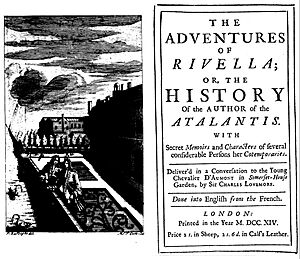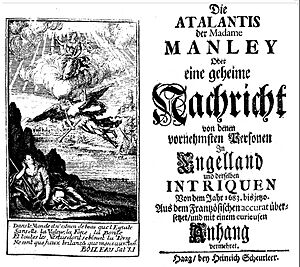Delarivier Manley facts for kids
Delarivier "Delia" Manley (born around 1663 or 1670 – died July 24, 1724) was an English writer, playwright, and political writer. She is sometimes mentioned with other famous female writers, Aphra Behn and Eliza Haywood. People called them "the fair triumvirate of wit," meaning three very clever women.
Some older books might say her first name was Mary. But we now know this is wrong. Mary was one of her sisters. Delarivier always called herself Delarivier or Delia.
Contents
Delarivier Manley's Early Life and Plays
Much of what we know about Delarivier Manley comes from her own writings. She included parts of her life story in her books, like The New Atalantis (1709) and Adventures of Rivella (1714).
Delarivier was likely born on the island of Jersey. She was the third of six children. Her father, Sir Roger Manley, was an army officer and historian. Her mother was from the Spanish Netherlands and died when Delarivier was young. It seems Delarivier and her sister, Cornelia, moved often with their father because of his army work.
After her father died in 1687, Delarivier and her sister became the responsibility of their cousin, John Manley. He was a member of Parliament. Delarivier married John Manley, and they had a son named John in 1691. In 1694, Delarivier left her husband. She went to live with Barbara Villiers, who was a friend of King Charles II. Delarivier stayed there for only six months before leaving.
From 1694 to 1696, Manley traveled a lot in England. During this time, she started writing plays. Her first play was a comedy called The Lost Lover, or, The Jealous Husband (1696). She also wrote a serious play called The Royal Mischief (1696). This play was made fun of by others. Another play, The Female Wits, joked about her and two other female playwrights. Delarivier stopped writing plays for ten years. She returned in 1707 with Almyna, or, The Arabian Vow. Ten years later, her play Lucius, The First King of Britain was performed.
Delarivier Manley's Political Writings
Manley became very famous, and even a bit scandalous, for her novel The New Atalantis in 1709. This book was a "roman à clef." This means it was a story where the characters were based on real people. She wrote about British politicians in a fictional way, setting the story on a faraway island.
The book caused a big stir. Manley was even arrested and questioned because people thought she had written bad things about powerful politicians. She had written about many important people. But Manley strongly said that her characters were not real people. The charges against her were eventually dropped. It was hard for those who felt insulted to prove she was writing about them without making themselves look even more foolish. In her book Adventures of Rivella, she again said her work was completely made up.
Because of this, people generally accepted that her books were fiction. This allowed her to keep publishing. She wrote another volume of Atalantis and two more books called Memoirs of Europe. These books used different fictional settings to talk about wider European events. Later, the Memoirs were sold as volumes three and four of Atalantis. Her book also inspired other writers to create similar stories.
Around 1710, a new political party, the Tories, won the election. Manley started working with another writer, Jonathan Swift, to write articles supporting the Tories. She also took over as editor of a newspaper called The Examiner. Her writings attacked the opposing party, the Whigs. She even received money from the new Prime Minister. But when a new king, George I, came to power, the Tory party lost influence. Manley's position became very difficult. She wrote a letter saying she had "nothing but a starveling scene before me," and that powerful people were angry with her.
Delarivier Manley's Later Works
Even though things were tough, Manley was a strong person. In 1714, another writer planned to write a book about her. But her publisher warned Manley. She contacted the writer and agreed to write the book herself. This resulted in her book Adventures of Rivella. In this book, Manley seemed to change her political views to be more moderate. This might have been to prepare for the changes in power. It's interesting that a Whig politician, Richard Steele, later helped produce her successful play Lucius in 1717.
Her last major work was The Power of Love in Seven Novels (1720). This book was a new version of older short stories. In Manley's stories, the female characters often took strong action against men who had betrayed them. While men betraying women was common in her earlier works, women getting revenge in a strong way was new to her later stories.
Delarivier Manley's Death
Delarivier Manley died at a printing house on Lambeth Hill. She had been ill for five days. Her body was buried in the middle of the Church of St Benet at Paul's-Wharf. There is a marble gravestone there with a special message about her. It says she was the daughter of Sir Roger Manley. It also says she was very knowledgeable and enjoyed polite writers in both French and English. Her cleverness made her fun to talk to, and her writings were enjoyed by everyone. She died on July 11, 1724.
See also
- Abigail Masham, Baroness Masham
- Bluestocking
- Dystopia
- Lady Mary Wortley Montagu
- Mademoiselle de Scudéry
- Menippean satire
 | Laphonza Butler |
 | Daisy Bates |
 | Elizabeth Piper Ensley |



